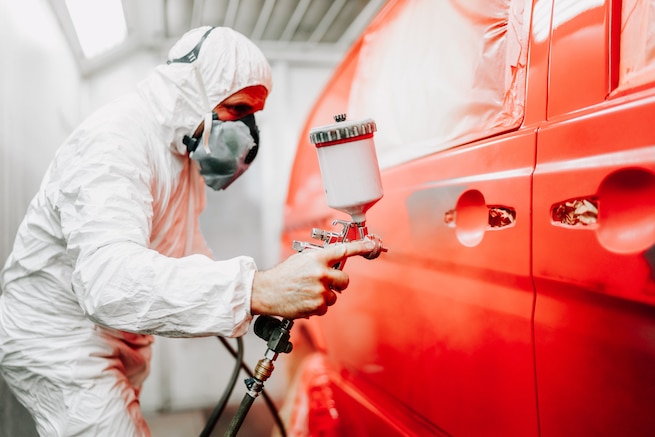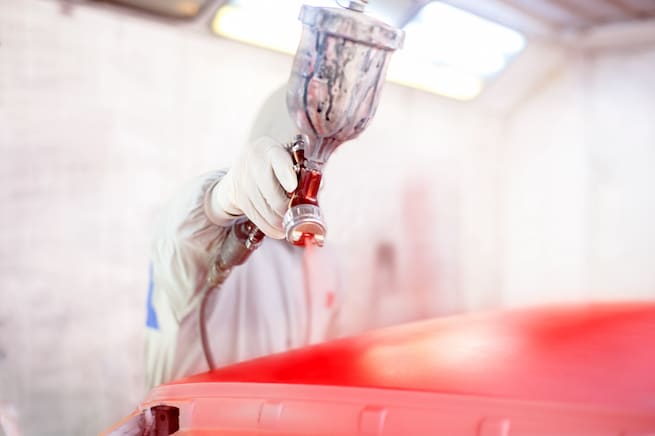How Much to Paint a Car: 5 Key Car Painting Factors To Know
Instead of getting a quick cosmetic fix, you should get a high-quality paint job. Using a car painting service that provides customers with a warranty on their paint jobs can ensure that customers will be satisfied with the results.
The paint job costs will depend on a variety of factors, including the make and model of the car, the extent of the painting project, and the type of paint that is used. So, how much to paint a car?
A basic DIY project to paint your own car can cost from $300 to $1000. Professional automotive paint services or high-quality paint jobs will cost anywhere from $1,000 to $4,500, depending on the complexity of the job. Other expensive custom paint jobs run upwards of 20,000, depending on the vehicle size.
Furthermore, if the car is being painted on a budget, then the painter may be able to suggest a lower-grade yet still satisfactory paint that will offer a comparable outcome at a lower cost. The painter may also be able to stretch the budget for cheap paint jobs by offering a discount or by cutting costs in other areas.
Ultimately, the cost of a car paint job is determined by the specific needs of the project, so it is important to evaluate all of the factors before deciding on an appropriate budget.
5 Factors that Affect the Cost of New Paint Job

When it comes to a fresh paint job for your car, there are a variety of factors to consider that will affect the cost. It is important to be aware of the factors that contribute to the cost of the job so that you can plan accordingly.
Here is a list of some of the factors that will affect the cost of paint jobs for your car:
#1 Size and Condition of the Vehicle
The size and condition of the vehicle are two of the most important factors that affect the cost of a paint job for a car. The size of the car directly relates to the amount of time and materials it takes to paint the entire surface area.
Additionally, the condition of the car is a major contributor to the cost. If there is existing damage, rust, dents, or scratches, then the cost may increase due to the extra labor and materials that must be used to repair the car before the paint job is applied.
#2 Number of Coats of Paint
The number of coats of paint that are applied to the vehicle is one of the most important factors that will determine the cost to paint your car. The more coats of paint that are applied, the more expensive the job will be for the customer. Generally, a base coat and a clear coat are the minimum recommended when painting a car.
Adding additional coats of paint, such as a color coat, can be more expensive, depending on the type of paint used. The amount of labor involved in the job will also affect the cost. A more complicated paint job that requires additional time and attention to detail will be more expensive than a standard paint job.
#3 Complexity of the Job
The complexity of a new paint job for a car is one of the most significant factors that will affect the cost. The complexity of the job can vary depending on the size of the car, the type of paint chosen, and the level of detail required.
The size of the car will affect the amount of time and material needed for the job, which can lead to an increased cost. Plus, the type of paint chosen will also affect the cost, as certain paints may be more expensive due to their quality or color.
Finally, the level of detail desired will also factor into the price, as custom detailing and intricate designs will require more time and materials for completion. The type of spray gun used will also affect the overall price of the job.
#4 Quality of Materials Used
The quality of materials used is one of the most important factors that affect the cost of to paint your car. High-grade materials such as automotive-grade paint, synthetic enamel paint, and clear coats offer superior protection and a longer life for your car.
The quality of the materials used in the job also determines the amount of time needed to complete a high-quality job. For example, using high-grade materials will require more time for preparation, priming, and painting, resulting in a more expensive paint job.
#5 Professionalism and Expertise of the Painter
An auto repair shop is experienced in the nuances of the auto painting project, from prepping the car for painting to the application of the new coat itself. They are also knowledgeable about the variety of paints and techniques that can be used to achieve the desired effect.
Hiring an experienced professional can also save money in the long run, as their expertise can help prevent costly mistakes and ensure a job is done right. Not all paint jobs will cost the same. Some auto painters charge over 3,000 in a budget shop.
When Should You Consider a Good Paint Job?
When considering painting a car, it is important to consider the age, condition, and worth of the vehicle, as well as the amount of money you are willing to invest in the project.
Generally speaking, basic paint jobs should be considered when the car is showing signs of wear and tear, with areas of rust and fading old paint.
If you have an older car and you would like to improve its aesthetic, basic paint jobs may be a great option, as they can give the car a fresh, new look.
Additionally, if the car has particularly bad scratches or dents, a basic paint job may be necessary in order to restore the car to its original condition.
What Are The Services Included In A Professional Paint Job?

Professional paint jobs for your car are a great way to upgrade its look and style. It will not only improve the look of the car, but it can also increase its value. When selecting a professional paint job, there are many services that are included to ensure that you get the best quality and most attractive finish possible.
The services typically included in a professional car’s paint job include:
- Automotive Surface Preparation: The automotive surface preparation process involves cleaning the car and removing any rust, dirt, and debris that has accumulated on the car’s exterior. This process is important to ensure a smooth and even surface for the new coat to adhere to.
- Sanding: This involves using sandpaper to remove any irregularities from the surface of the car.
- Primer: Primer is then applied to the car to help ensure that the paint adheres properly and looks smooth after the job is finished.
- Painting: This involves applying several coats of paint to ensure a uniform and durable finish.
- Clay Bar Treatment: This process involves applying a clay bar to the car’s surface to remove contaminants and pollutants that are embedded in the paint’s surface.
- Clear Coat: This step involves the application of a ceramic coating to protect the entire car.
- Finishing: The family vehicle is buffed and polished to give it a glossy finish.
- Well-ventilated garage: Professionals typically use climate-controlled booths and not open-air paint areas to provide a showroom quality service.
Where To Get Your Car Painted?
If you are looking to get your car painted, there are a few options available. Depending on your budget and the complexity of the job, you can choose from a variety of professional auto body repair, auto painters, and paint services. If you are looking for a more affordable option, you can choose to do it yourself.
However, it is important to remember that with DIY projects, you run the risk of doing a less-than-satisfactory job. Professional shops offer several advantages when it comes to painting your car, including an experienced staff with the necessary expertise and tools to get the job done right.
FAQs About Car Repainting
How Much Does it Cost to Get New Paint for My Car?
The cost of repainting a car can vary widely depending on the type of paint and the amount of labor required. Most professional auto body shops will charge between $500 and $4000 to completely repaint a vehicle, depending on the condition of the car and the type of paint used.
If you are looking to get a custom paint job, such as a pearl or metal-flake finish, it will likely cost more. Additionally, the cost of paint will vary based on the type of car, the quality of the paint, and the paint color you choose. The cost of labor to prep, spray, and finish the car will also factor into the total cost.
How Long Will Fresh Paint Last On My Car?
The longevity of the paint finish on a new car is highly dependent on the paint type, care, and environmental conditions. Generally speaking, a great paint job will last anywhere from 5 to 10 years with proper care, although lower-quality paint jobs may need to be reapplied sooner.
To ensure that your paint job lasts as long as possible, it is important to keep your car clean and waxed regularly. Contacting body shops is not a bad idea if you want a high-quality vehicle facelift. Professional painting is going to get you a better result instead of going for a DIY project.
Last Updated on: March 16, 2025

